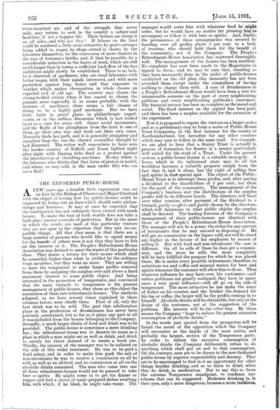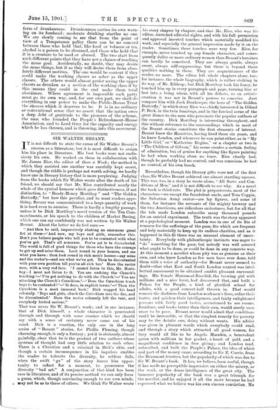. THE REFORMED PUBLIC-HOUSE.
AFEW years ago a humble little experiment was set on foot by the Bishop of Chester and Major Craufurd with the object of testing how far public-houses could be improved by being run on lines which should unite philan- thropy and business. It may at once be conceded that the combination has not ordinarily been viewed with much favour. To make the best of both worlds does not take a high place among counsels of perfection. But in the sense in which the words are used of this particular venture they-are not open to the objection that they mix incom- patible things. All that they mean is that there are a large number of -persons who would like to spend money for the benefit of others were it not that they have to live on the interest of it. The People's Refreshment-House Association was devised to meet the wants of this particular class. They desire a return for their money which shall be somewhat higher than what is yielded by the ordinary trust securities, but they want no more. They are willing to have the temptation to make larger profits removed from them by assigning the surplus over and above a fixed maximum interest to some public object. And being interested in the promotion of temperance, and convinced that the main obstacle to temperance is the present management of public-houses, they chose as this object the conversion of them into refreshment-houses. The methods adopted, as we have several times explained in these columns before, were chiefly three. First of all, only the best drink was to be sold. The part that adulteration plays in the production of drunkenness has never been precisely ascertained, but so far as it plays any part at all it was excluded from the houses belonging to the Company. Secondly, a much larger choice of food and drink was to be provided. The public-house is sometimes a mere drinking bar ; the refreshment-house was to deserve its name as a place in which a man might eat as well as drink, and drink to satisfy his thirst instead of to create a fresh one. Thirdly, the interest of -the manager was to be enlisted on the side of this wider treatment. He was to be paid a fixed salary, and in order to make him push the sale of non-intoxicants he was to receive a commission on all he sold, as well as on all food, and no commission at all on the alcoholic drinks consumed. The man who came into one of these refreshment-houses would not be pressed to take beer or spirits. He might come in to get his dinner or supper and find a choice of ready-prepared dishes awaiting him, with which, if he liked, he might take water. The manager would serve him with whatever food he 4ht order, but he would have no motive for pressing him. te accompany or follow it with beer or spirits. And, finally, the permanence of these arrangements was secured by handing over all profits above 5 per cent. to a body of trustees, who should hold them for the benefit of the community, not of the Company. The People's Refreshment-House Association has answered thoroughly well. The management of the houses has been excellent. No complaint has ever been made to the Magistrates in regard to them ; and we may be sure that, standing as they have necessarily done in the midst of public-houses conducted on the old plan, this immunity has not been accorded them except under the compulsion of having nothing to charge them with. A case of drunkenness in a People's Refreshment-House would have been a text for innumerable sermons on the part of every neighbouring publican and every neighbouring publican's customers. The financial success has been as complete as the moral and social. The fixed interest on the capital has been paid, and there has been a surplus available for the extension of the experiment.
Now it is proposed to repeat the venture on a larger scale ; and as a preliminary step to form a series of Public-House Trust Companies, in the first instance for the county of Northumberland, but hereafter for any other counties which may care to follow in the same road. For example, we are glad to hear that a Surrey Trust is actually-in process of formation, for Surrey is a county particularly well suited for the work of a Trust. Under the present system, a public-house license is a valuable monopoly. A house which in its unlicensed state may be all but worthless becomes a valuable property simply from the fact that it, and it alone, has the right of selling beer and spirits in that special spot. The object of the Public- House Trust is to intercept these profits, and, after paying a dividend to the shareholders of 5 per cent., use them .for the good of the community. The management of the Company's business and the distribution of the surplus profits will be in different hands. The directors will hand over what remains after payment of the dividend to a Council, partly er-officio and partly chosen by the directors, which will determine to what public objects the surplus shall be devoted. The leading features of the Company's management of their public-houses are identical with those of the People's Refreshment-House Association. The manager will not be a penny the richer for any amount of intoxicants that he may succeed in disposing of. He will get no commission on the liquor sold, nor will he stand any higher in the favour of his employers by reason of selling it. But with food and non-intoxicants the case is different. On all he sells of these he does get a commis- sion, and the more he sells the more completely will he have fulfilled the purpose for which he was placed there. He is under every possible inducement, therefore, to substitute tea and coffee and mineral waters for beer and spirits whenever the customer will allow him to do so. Thus whatever influence he may have over his customers—and unless publicans are greatly maligned, they have in many cases a very great influence—will all go on the side of temperance. The more attractive he can make the array of dishes on his counter, and the brisker the demand for his tea or coffee, the larger will be the profits coming in to himself. Alcoholic drinks will be obtainable, but only at the desire of the customer, not at the suggestion of the publican. His interest will be the other way. By these means the Company " hope to reduce the present excessive consumption of alcoholic drinks."
In the words just quoted from the prospectus will be found the secret of the opposition which the Company will encounter at the hands of the most active, and probably the largest, section of the Temperance party. In order to reduce the excessive consumption of alcoholic drinks the Company deliberately refuse to do - anything which shall put an end to that consumption. On • the contrary, men are to be drawn to the new-fashioned public-house by superior respectability and decency. They are to -be encouraged to find in it an opportunity for other things besides drinking, and so to learn to drink, when they do drink, in moderation. But to say this is, from the extreme Temperance standpoint, to condemn any scheme that can be suggested. Moderate drinking is, in their eyes, only a more dangerous; because a more -insidious, form of drunkenness. Drunkenness carries its own warn- ing on its forehead ; moderate drinking startles no one. We are slowly coming to see that from the point of view. of a Temperance policy there can be no concord between those who hold. that, like food or tobacco or tea, alcohol is a poison to be shunned, and those who hold that it is a creature to be used or abused. The two start from such different points that they have not a chance of reaching the same goal. Accidentally, no doubt, they may desire the same things, but if so they will desire them from abso- lutely different motives. The one would be content if they could make the working classes as sober as the upper classes. The others would almost prefer seeing the upper classes as drunken as a section of the working class if by this ',means they could in the end make them total abstimers. Where agreement is . impossible each party must go its own way, and, for our own part, we shall (10 everything in our power to make the Public-House Trust the success which it deserves to be. It is in no ordinary or conventional sense that we assert that the nation owes a deep debt of gratitude to the pioneers of the scheme, the men who founded the People's Refreshment-House Association, and to Lord Grey for the capacity and energy which he has thrown, and is throwing, into this movement.











































 Previous page
Previous page